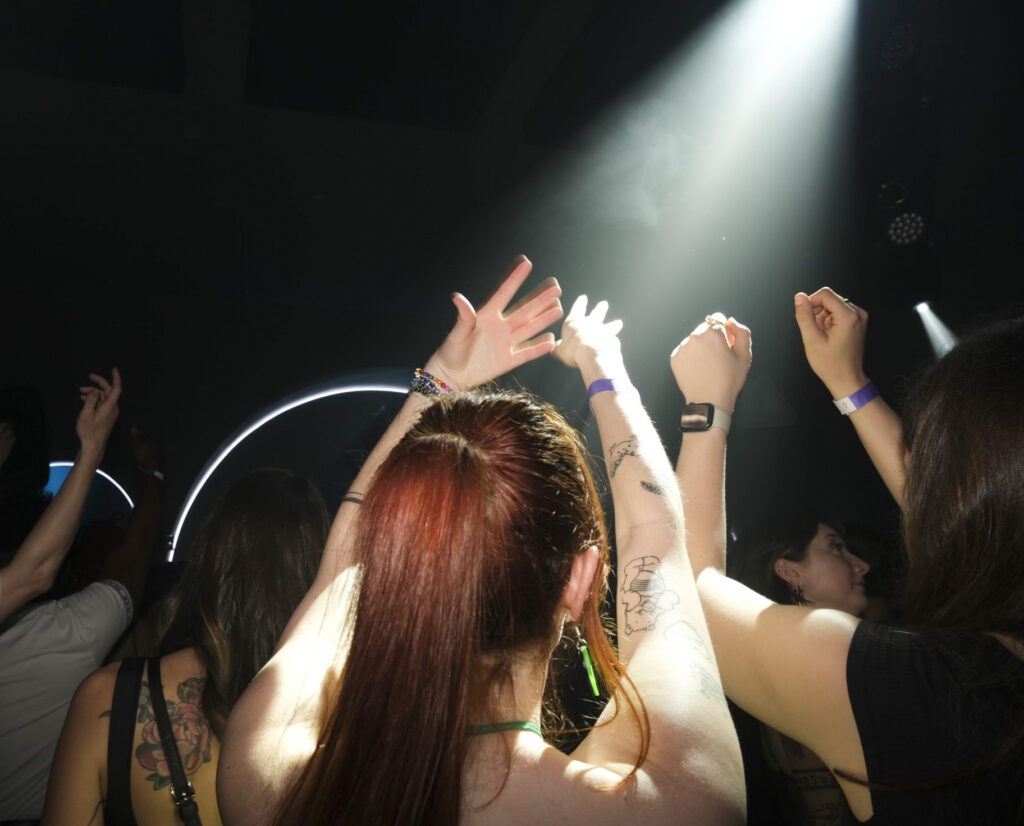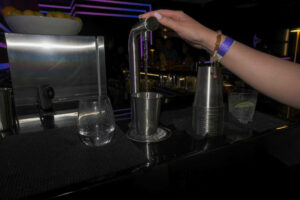
For the most part, the Night We Met seems like a typical nightclub: massive subwoofers, iridescent lasers and a glamorous crowd on weekends.
But it has one notable difference: reusable cups.
The club opened in Nashville last month with a goal of making partying more sustainable.
“We just want to do the right thing and inspire other people to do the same,” said Joel Atchison, the club’s sustainability manager. Atchison is also a founder of the Deep Tropics music festival in Nashville and heads its “Deep Culture” sustainability program.
 Caroline Eggers WPLN News
Caroline Eggers WPLN NewsPatrons at the Night We Met drank from aluminum cups on March 29, 2024.
The Night We Met is a small club focused on house, a form of electronic dance music, with a capacity of just 350 people. It is located in a former music venue called 12th and Porter in the Gulch, just a short walk from Broadway where many thousands of plastic cups are tossed out each night.
For now, the main distinction of the club is its cups — and a lack of trash cans. The Night We Met uses aluminum tumblers for water and cocktails, and reusable plastic wine and champagne glasses.
Reducing plastic use is a big deal. Plastic, which is mostly made out of fossil fuels, is responsible for about 5% or more of global planet-heating emissions and causes pollution throughout its entire life cycle, ending up in landfills, soils, the ocean and our bodies.
The club also composts its organic materials with Compost Nashville and recycles the glass and single-use aluminum from liquor bottles, wine and beer cans. To reduce the need for recycling — or even eliminate it entirely — the club would need help from alcohol vendors and perhaps some creative thinking, bar experts say.
But the Night We Met has succeeded in one goal: The club has created a new waste standard in Nashville that could be replicated by other establishments.
 Caroline Eggers WPLN News
Caroline Eggers WPLN NewsThe Night We Met has water stations with aluminum cups.
Atchison hopes to progressively lower the club’s overall environmental impact by reducing its energy use. The sustainability manager said the club could one day have geothermal heat pumps and even kinetic dance floors, which are systems that convert body heat from dancers into energy. He mentioned that solar wasn’t an option at the moment — and that’s true financially for most local businesses and homeowners because of Tennessee Valley Authority policies and the lack of net metering, which would have utilities pay customers for producing solar energy.
Eventually, Atchison said he hopes that guests of the club will have a role in changing social norms in nightlife.
“When you walk into a bathroom, and there’s trash all over the floor, it does nothing to elevate your experience. It doesn’t make you feel a sense of responsibility,” Atchison said.
On the official opening night of the club last month, guests did notice the change.
“You don’t want to keep throwing away,” said Maddie McDougald, an electronic dance music fan who lives in Nashville. “It feels cleaner. It feels better.”
Sasha Bajwa drove from Atlanta to check out the club. She had a special interest, given her own environmental studies and fondness for EDM.
“I’ve been to a lot of clubs around the world and I actually haven’t seen any club that’s focused on sustainability,” Bajwa said. “It’s people from the community making these small changes.”

